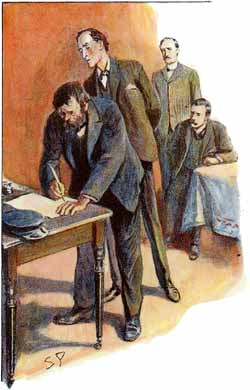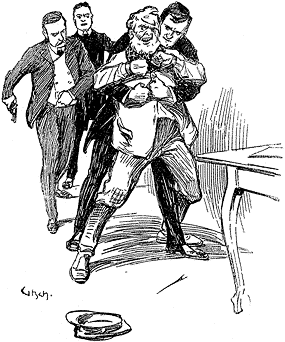| Black Peter 7 | Black Peter 8 |
“Well, Watson, what do you think of it?” asked Holmes, as we travelled back next morning.
“I can see that you are not satisfied.”
“Oh, yes, my dear Watson, I am perfectly satisfied. At the same time, Stanley Hopkins’s methods do not commend themselves to me. I am disappointed in Stanley Hopkins. I had hoped for better things from him. One should always look for a possible alternative, and provide against it. It is the first rule of criminal investigation.”
“What, then, is the alternative?”
“The line of investigation which I have myself been pursuing. It may give us nothing. I cannot tell. But at least I shall follow it to the end.”
Several letters were waiting for Holmes at Baker Street. He snatched one of them up, opened it, and burst out into a triumphant chuckle of laughter.
“Excellent, Watson! The alternative develops. Have you telegraph forms? Just write a couple of messages for me: ‘Sumner, Shipping Agent, Ratcliff Highway. Send three men on, to arrive ten to-morrow morning. – Basil.’ That’s my name in those parts. The other is: ‘Inspector Stanley Hopkins, 46 Lord Street, Brixton. Come breakfast to-morrow at nine-thirty. Important. Wire if unable to come. –Sherlock Holmes.’ There, Watson, this infernal case has haunted me for ten days. I hereby banish it completely from my presence. To-morrow, I trust that we shall hear the last of it forever.”
Sharp at the hour named Inspector Stanley Hopkins appeared, and we sat down together to the excellent breakfast which Mrs. Hudson had prepared. The young detective was in high spirits at his success.
“You really think that your solution must be correct?” asked Holmes.
“I could not imagine a more complete case.”
“It did not seem to me conclusive.”
“You astonish me, Mr. Holmes. What more could one ask for?”
“Does your explanation cover every point?”
“Undoubtedly. I find that young Neligan arrived at the Brambletye Hotel on the very day of the crime. He came on the pretence of playing golf. His room was on the ground-floor, and he could get out when he liked. That very night he went down to Woodman’s Lee, saw Peter Carey at the hut, quarrelled with him, and killed him with the harpoon. Then, horrified by what he had done, he fled out of the hut, dropping the notebook which he had brought with him in order to question Peter Carey about these different securities. You may have observed that some of them were marked with ticks, and the others – the great majority – were not. Those which are ticked have been traced on the London market, but the others, presumably, were still in the possession of Carey, and young Neligan, according to his own account, was anxious to recover them in order to do the right thing by his father’s creditors. After his flight he did not dare to approach the hut again for some time, but at last he forced himself to do so in order to obtain the information which he needed. Surely that is all simple and obvious?”
Holmes smiled and shook his head.
“It seems to me to have only one drawback, Hopkins, and that is that it is intrinsically impossible. Have you tried to drive a harpoon through a body? No? Tut, tut, my dear sir, you must really pay attention to these details. My friend Watson could tell you that I spent a whole morning in that exercise. It is no easy matter, and requires a strong and practised arm. But this blow was delivered with such violence that the head of the weapon sank deep into the wall. Do you imagine that this anaemic youth was capable of so frightful an assault? Is he the man who hobnobbed in rum and water with Black Peter in the dead of the night? Was it his profile that was seen on the blind two nights before? No, no, Hopkins, it is another and more formidable person for whom we must seek.”
The detective’s face had grown longer and longer during Holmes’s speech. His hopes and his ambitions were all crumbling about him. But he would not abandon his position without a struggle.
“You can’t deny that Neligan was present that night, Mr. Holmes. The book will prove that. I fancy that I have evidence enough to satisfy a jury, even if you are able to pick a hole in it. Besides, Mr. Holmes, I have laid my hand upon my man. As to this terrible person of yours, where is he?”
“I rather fancy that he is on the stair,” said Holmes, serenely. “I think, Watson, that you would do well to put that revolver where you can reach it.” He rose and laid a written paper upon a side-table. “Now we are ready,” said he.
There had been some talking in gruff voices outside, and now Mrs. Hudson opened the door to say that there were three men inquiring for Captain Basil.
“Show them in one by one,” said Holmes.
The first who entered was a little Ribston pippin of a man, with ruddy cheeks and fluffy white side-whiskers. Holmes had drawn a letter from his pocket.
“What name?” he asked.
“James Lancaster.”
“I am sorry, Lancaster, but the berth is full. Here is half a sovereign for your trouble. Just step into this room and wait there for a few minutes.”
The second man was a long, dried-up creature, with lank hair and sallow cheeks. His name was Hugh Pattins. He also received his dismissal, his half-sovereign, and the order to wait.
The third applicant was a man of remarkable appearance. A fierce bull-dog face was framed in a tangle of hair and beard, and two bold, dark eyes gleamed behind the cover of thick, tufted, overhung eyebrows. He saluted and stood sailor-fashion, turning his cap round in his hands.
“Your name?” asked Holmes.
“Patrick Cairns.”
“Harpooner?”
“Yes, sir. Twenty-six voyages.”
“Dundee, I suppose?”
“Yes, sir.”
“And ready to start with an exploring ship?”
“Yes, sir.”
“What wages?”
“Eight pounds a month.”
“Could you start at once?”
“As soon as I get my kit.”
“Have you your papers?”
“Yes, sir.” He took a sheaf of worn and greasy forms from his pocket. Holmes glanced over them and returned them.
“You are just the man I want,” said he. “Here’s the agreement on the side-table. If you sign it the whole matter will be settled.”
The seaman lurched across the room and took up the pen.
“Shall I sign here?” he asked, stooping over the table.

Holmes leaned over his shoulder and passed both hands over his neck.
“This will do,” said he.
I heard a click of steel and a bellow like an enraged bull. The next instant Holmes and the seaman were rolling on the ground together. He was a man of such gigantic strength that, even with the handcuffs which Holmes had so deftly fastened upon his wrists, he would have very quickly overpowered my friend had Hopkins and I not rushed to his rescue. Only when I pressed the cold muzzle of the revolver to his temple did he at last understand that resistance was vain. We lashed his ankles with cord, and rose breathless from the struggle.

“I must really apologize, Hopkins,” said Sherlock Holmes. “I fear that the scrambled eggs are cold. However, you will enjoy the rest of your breakfast all the better, will you not, for the thought that you have brought your case to a triumphant conclusion.”
Stanley Hopkins was speechless with amazement.
“I don’t know what to say, Mr. Holmes,” he blurted out at last, with a very red face. “It seems to me that I have been making a fool of myself from the beginning. I understand now, what I should never have forgotten, that I am the pupil and you are the master. Even now I see what you have done, but I don’t know how you did it or what it signifies.”
“Well, well,” said Holmes, good-humouredly. “We all learn by experience, and your lesson this time is that you should never lose sight of the alternative. You were so absorbed in young Neligan that you could not spare a thought to Patrick Cairns, the true murderer of Peter Carey.”
The hoarse voice of the seaman broke in on our conversation.
| Black Peter 7 | Black Peter 8 |